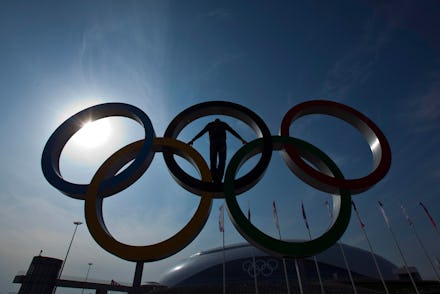Behind the 2014 Winter Olympics Was a Major Russian Mafia Turf War

While the world watched 1,000 years of idealized Russian history play out at the Winter Olympics, a cast of major players was conveniently missing from the spectacle: organized crime bosses, the ruthless lords of the Russian underworld that have shaped post-Soviet Russia and Sochi.
It's past time the spotlight lands on them. Government apathy towards this "mafia" class has allowed organized crime lords to profit from the Olympic Games and wage underground turf wars that ripple throughout Russian society.
Organized crime bosses have plagued Russia since the fall of the Soviet Union — cementing corruption, extortion and bribery into Russian society. Sochi, a hotel-studded seaside resort, once a playground for the Soviet elite, was a battleground for crime, even before Russia won the Olympic bid in 2007.
Image Credit: Wikipedia
Many of Sochi's businesses are, in fact, under the thumb of criminal lords — forced to pay protection money and bribes. The Sochi Olympics were a prize to be won for crime lords, leading to hegemonic competition and a violent crime war for control of the city and the games themselves.
Ded Khasan (Aslan Usoyan), the proclaimed godfather of Sochi, gained control of the city's criminal underground following the fall the Soviet Union in 1991. According to Russian crime expert Mark Galeotti, increased attempts by other criminal groups (including fellow Georgian Tariel Oniani) to break the godfather's control of the city's underground economy escalated markedly following Sochi's Olympic bid victory in 2007.
Crime wars are excruciatingly violent, and the battle for Sochi was no exception. In 2009, Oniani's men gun downed Khasan's main Olympic operative, Alik Minalyan, plunging the city and country into a series of targeted assassinations. (Minalyan was responsible for ensuring the Khasan network's control over the racketeering and development projects that bubbled up as the games approached.) A little over a year later, Oniani's men assasinated Minalyan's replacement in a café in downtown Sochi. Then in January 2013, Khasan was assassinated as he left his favorite Moscow restaurant.
His murder created an open season for control of Sochi as Oniani and other regional organized crime lords made their way into Khasan's foundering empire.
Despite previous efforts for a peace deal between the rival factions in 2008, the high financial stakes of Russian organized crime and interference from the Russian state prevented a settlement. In reality, the Sochi battle was a part of a larger organized crime war that has continued to plague Moscow and other major cities.
Despite the pomp and veneer of the Olympic Games, Sochi has long been captive to organized crime and criminal wars. This is a microcosm of a larger Russian problem: Crime riddles Russia's past and present, and despite Putin's attempts to root out the main organized crime groups, he is rumored to have forged pseudo-alliances that have allowed crime lords to thrive.
Government action against organized crime has been weak and has been aimed at those organized crime bosses who do not follow orders from the Kremlin. Their presence only feeds continued corruption — further amplifying extortion, money laundering and bribery.
As the Winter Olympics fade from the spotlight, the spotlight on organized crime cannot.